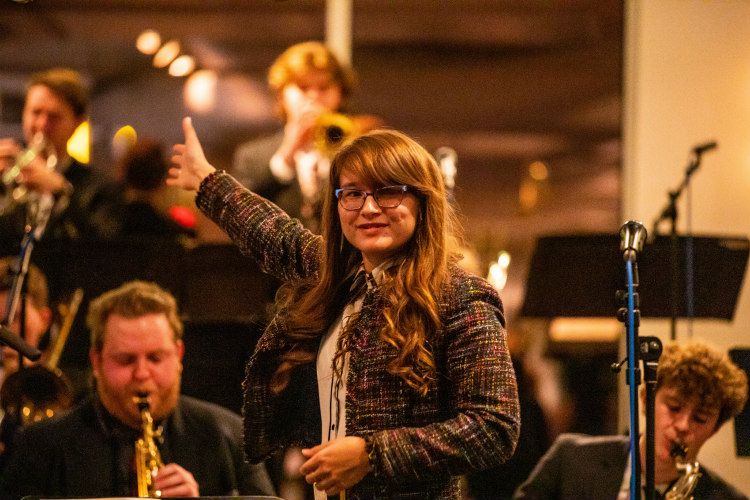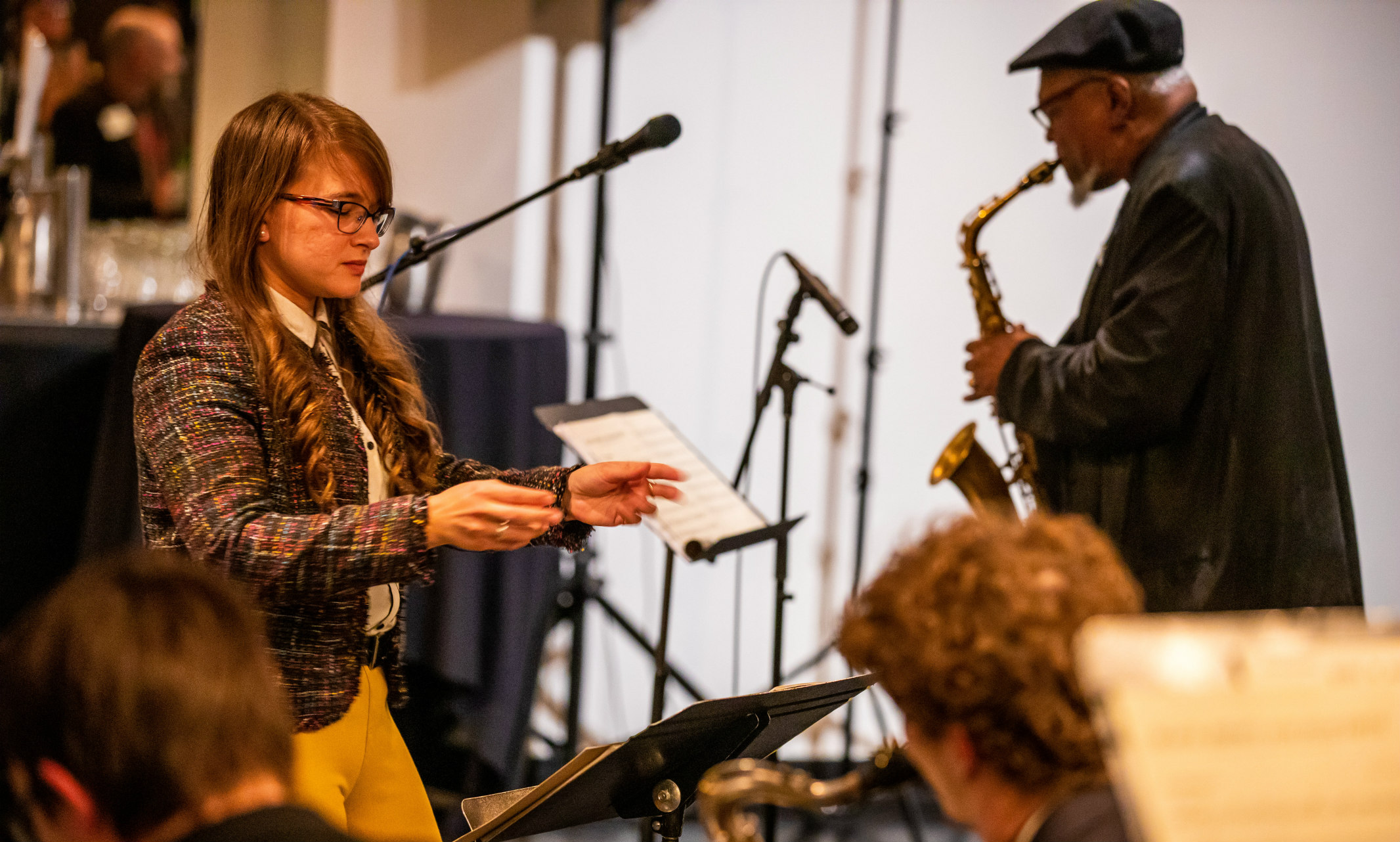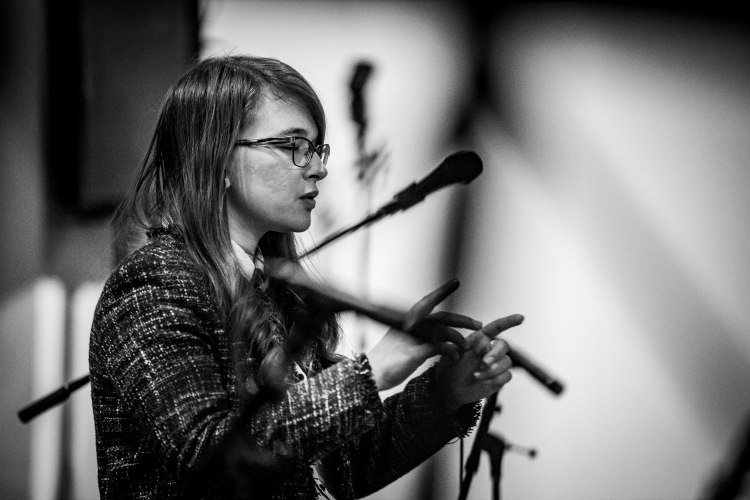UMKC Conservatory Jazz Studies alumna Aryana Nemati-Baghestani (B.M. ’14) spoke with us about her experiences as a female in jazz, what she’s been up to during the pandemic and her future goals.
Where does your passion for music stem from?
I remember in middle school having a portable CD player (Sony Walkman) and carrying it with me everywhere I went. At the time, I also joined band class playing alto saxophone. My brother and sister, who are older, were also in band so I was inspired by them to join. My mother played clarinet in grade school and my father never really picked up an instrument, but I later realized how avid music listeners and music lovers they were and still are. I didn’t start really listening to jazz until I was in high school. My main influences before then were mainly pop, hip-hop, reggae, alternative and R&B.
I was fortunate to be a part of the distinguished band program at Grandview High School. Garry Anders was the band director for only a short time while I was there, but I learned so much from him and was exposed to music and musicians I didn’t know about, which has had a lasting impact on my career and life as a whole.
At first, I was inspired by music because of the way it sounded and how it made me feel. As I got older, I began to appreciate and understand why many styles of music came to be. Because jazz and reggae, two genres of music that are dear to me, came to fruition mostly because of oppression, music and its creation has a completely different meaning to me and motivates me in new ways.
What instrument(s) do you play?
I started my musical journey in middle school on the alto saxophone. About a year later, I switched to the baritone saxophone primarily. When I got to high school, our band director was adamant about getting the saxophone players to be able to “double” on flute and clarinet, so I began to work on both. I am glad I did so at a younger age, because it has definitely come in handy. My brother played the oboe, and I came across some opportunities that had some oboe playing/teaching. With his help, I was able to learn that instrument as well. I took some keyboarding classes in college and continue to work on my keyboard skills. This is one instrument I wish I would have started sooner. I believe it is an important one to know for any musician. I also play a little electric bass and drums for fun.
Jazz is seen as a male-dominated industry, particularly regarding instrumentalists. What drew you to it?
I was introduced to jazz later in my middle school years and enjoyed playing in the jazz band. I did not really get into jazz until high school. I was exposed to certain artists and performances that I was naturally attracted to for reasons, at the time, I could not put into words. I did know that I felt attentive and intrigued when listening. Also, at this time, I had not really noticed how male-dominant jazz was.
What has been your experience as a female in the profession?
My experience has been good and bad. I didn’t start realizing that the field, even in Kansas City, was male-dominated until I got to college and began playing professionally. There were only a few females in the jazz department (none on staff) and it felt as though there were even fewer at the jam sessions and gigs around town. As I began to understand the lack of women in the field more, it both discouraged and encouraged me. It isn’t easy being a woman of jazz. You get a lot of sexist comments on gigs and as a woman. Even if you have worked extremely hard to become a working musician, that stigma stays with you. I have been fortunate though to work with people that hire me solely because of my playing, and I feel their intentions are genuine. I have also had people, such as young women or parents with daughters that play instruments, come up to me at shows and thank me for what I am doing or tell me that it is inspiring for them to see a female performing on an instrument. As difficult as it is, it is experiences like those, genuine people, and my love for the music, that pushes me to continue on.
How do you hope to encourage the next generation of female musicians? Or next generation of musicians in general?
I believe exposure is a big part of it. Thankfully today, there are many well-known female musicians that have successful performing careers. With my female students, I like to show them videos and recordings of these artists to exhibit that there are artists out there, we just have to do some digging. I do expose all my students to current musicians of all walks of life. In the general media, there is not a lot of exposure to jazz, and I do my best to provide resources for them. I have been thinking about doing more community outreach in this respect, to get the word out there. Visiting local schools and giving clinics about jazz. Especially in Kansas City, with the great jazz history we have and the thriving music community, I like to encourage them to go to jam sessions and see live shows because there are opportunities and things happening but, again, you may not see a commercial for it or hear it on the typical radio stations.
"Because jazz and reggae, two genres of music that are dear to me, came to fruition mostly because of oppression, music and its creation has a completely different meaning to me and motivates me in new ways."
Why did you choose UMKC?
Being a Kansas City native, it was definitely one of my top options for school. I was fortunate enough to see Bobby Watson perform a number of times while I was in middle and high school and was always blown away by his playing, so to be able to go to the school he taught at was a huge plus. I also got to see the jazz bands at the Conservatory perform while I was in high school and remember thinking how great the band sounded, as well as the soloists, and that I would be honored to be a part of the program. Luckily, they accepted me when I auditioned!
Who was your most influential faculty or staff member at UMKC?
I am not able to choose only one. The faculty in the jazz department were great people and phenomenal performers, but I did work with some more closely than others. Doug Auwarter was a drum instructor (now happily retired) but he also taught the Latin jazz combos. He has a huge heart and is one of the sweetest people I know. He is extremely well-versed in many areas, but Latin rhythms and styles was one of the things that he was teaching primarily at UMKC, and he was definitely the one for the job.
I was fortunate to work with two wonderful saxophone teachers and my experiences with them will be with me forever. Dan Thomas was teaching mainly the freshman and sophomore classes and I took lessons with him for two years. I will be honest, at first, he stressed me out! He had high standards and was full of energy. Some of the things that he would tell me to work on I would think to myself, “are you crazy? There is no way I can do that!” but little did I know, Dan believed in me and was pushing me to reach my full potential unlike any mentor I had before. I ended up being able to do things I never thought I could because of Dan, and I am forever grateful for his tutelage.
And then of course, Bobby. Another kind-hearted man, but would not sugarcoat the truth. He taught me to never take for granted picking up your horn, to have fun but also, that we need to take this musically seriously. Just being around him was inspiring.
I am pleased to say that I am still in contact with all three of these mentors and am happy to call them my friends as well.
"Thankfully today, there are many well-known female musicians that have successful performing careers."
What are your lifelong goals?
Most of all, I want to live a happy life. I would like to have a successful performing career and work with a group of other musicians that believe in the music that is being performed. I enjoy learning about other cultures, so it would be nice to live abroad for some time and do more traveling. I have thoughts of starting a nonprofit that would benefit young musicians, primarily females and people of color. I would like to have a family and be able to provide a comfortable living situation for them. I have been doing this a bit, but I would like to explore other hobbies more, and get better at them, such as, painting, gardening, and woodworking.
Who are your favorite jazz musicians?
There have been quite a few musicians that have inspired me over the years, primarily saxophonists. One of the first was Cannonball Adderley. I had not listened to much jazz when I came across him, but I remember thinking when listening to him, “Wow, how does he even do that?” Another one of my early influences was Bobby Watson. He was one of the first musicians I saw perform live and I will always remember that concert with the high school band in my high school auditorium. I love the personality and phrasing of Sonny Rollins. For the baritone saxophone, Ronnie Cuber is a huge inspiration. In my opinion, he has the quintessential sound for the horn and his ideas are thorough and precise and full of soul. I stumbled upon Charles McPhearson a bit later and when I heard him, I was surprised I had not heard of him before. I have been listening to him quite a bit lately.

Where can we hear you play?
As of now, for live settings it is hard to say. I have done a few Facebook Live shows, but am taking a break from it to focus on other aspects of music (practicing, writing). I know that some places are having live music, but I feel now is a good time to reflect and meditate instead of rush back onto the scene. I did come out with a reggae/jazz album that is on some streaming platforms such as YouTube and iTunes. A great summer soundtrack. It is entitled The Sax in I.
What have you been up to during the COVID quarantine?
Since the quarantine and the end of semester for school, I have been primarily teaching online music lessons. I have done some livestream gigs here and there as well. They started out as solo shows but I have had the pleasure of playing with small groups (trios and quartets) mainly outside, on patios and driveways. There have also been some home and studio recording projects for clients and myself that I have been working on. I have also been going for walks, bike rides, working on small home projects, and gardening.
A couple of local musicians, Marcus Lewis and Matt Otto, started a weekly Zoom meeting that primarily includes jazz musicians in KC, and our main focus is to discuss the racial injustices that are a big issue in America. This has been great, not only seeing everyone, but working together to figure out what we can do to make a difference for the better. It is also insightful hearing people’s opinions and experiences. I’ve known most of the folks for some time but never got to have discussions with them such as the ones we are having now.


